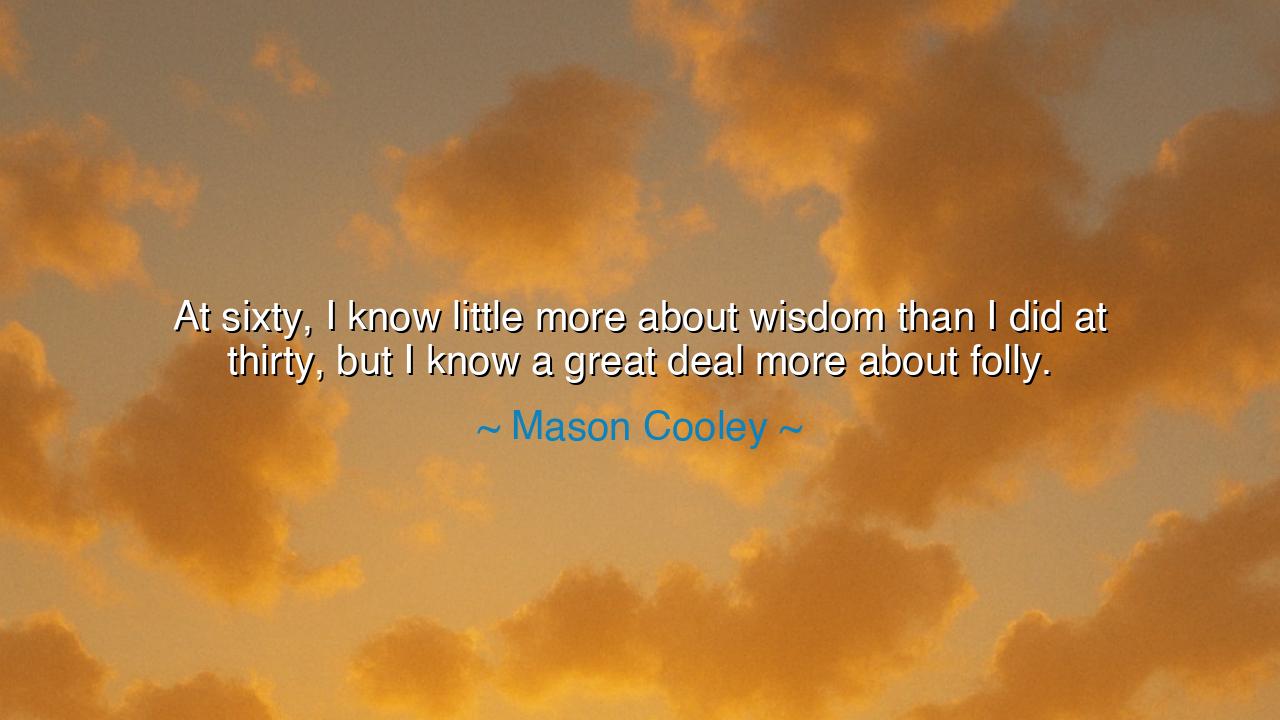
At sixty, I know little more about wisdom than I did at thirty
At sixty, I know little more about wisdom than I did at thirty, but I know a great deal more about folly.






Hearken, children of ages yet to come, to the reflective words of Mason Cooley, who observed: “At sixty, I know little more about wisdom than I did at thirty, but I know a great deal more about folly.” In this utterance lies the eternal truth of human experience and self-knowledge: that while the pursuit of wisdom may stretch across decades, it often eludes full mastery, yet the recognition of folly—its forms, its patterns, and its consequences—grows ever clearer with the passage of time.
Cooley teaches that age imparts discernment, even if it does not confer ultimate wisdom. The youthful mind may strive eagerly for understanding, but it is the lived experience of error, misjudgment, and human weakness that sharpens the eye to folly. In observing both the world and oneself, one becomes adept at identifying what is unwise, misguided, or transient, even if the ultimate truths remain veiled. Insight into folly is itself a form of knowledge, a guide to cautious action and thoughtful reflection.
Consider the life of King Solomon, famed for his wisdom yet not immune to error. His early judgments were brilliant, yet later years revealed missteps and indulgences that clouded his reign. Through his experiences, the patterns of folly became manifest: pride, excess, and human weakness are lessons often learned too late to avoid consequence. In this, Cooley’s reflection resonates: understanding folly often precedes mastery of wisdom, and age grants the clarity to perceive what once was invisible.
The ancients themselves recognized this duality. The Stoics, from Seneca to Marcus Aurelius, emphasized that human life is a continual exercise in discerning what is true, right, and virtuous, and that the mind grows sharper in recognizing error even as it humbly acknowledges the limits of wisdom. Cooley’s words echo this ancient teaching: experience refines perception, revealing folly as clearly as it tempers the ambitions of the soul.
Thus, his observation is both caution and consolation. Though the ultimate attainment of wisdom may remain elusive, the knowledge of folly equips the aged to act with prudence, temperance, and judgment. To know the ways in which humans falter is to possess a lantern in the dark, a guide through the thickets of error that entrap the unwary.
Carry this teaching, children of generations yet to rise: honor the lessons of age and experience, not for the promise of complete wisdom, but for the clarity with which they reveal human folly. In the recognition of error lies both humility and guidance, and through this discernment, the soul navigates the trials of life with vigilance, grace, and tempered understanding.






V2Vuu Ngoc Bao Trieu Vy 22-05-02
I find this observation deeply human. It acknowledges that knowledge and understanding don’t necessarily increase at the same rate. Maybe wisdom can’t be quantified, while folly constantly renews itself through experience. Every stage of life reveals new forms of error. I’m curious—does Cooley express resignation or acceptance here? Is he lamenting the lack of progress toward wisdom, or celebrating the humility that comes with knowing how much we still don’t know?
YTTran Thi Yen Thu
This statement makes me reflect on how people often expect age to bring clarity, when in reality, it may just bring perspective. Cooley seems to suggest that folly is the constant companion of human experience. Maybe wisdom doesn’t grow because folly expands just as fast. Do we ever outgrow our mistakes, or do we just learn to laugh at them? Perhaps the older we get, the better we understand our own contradictions.
HTTHANH HUYEN TO
There’s something bittersweet about this. It feels like Cooley is confessing that life doesn’t simplify with age—it just exposes more contradictions. I wonder if this realization brings peace or frustration. If wisdom remains out of reach, is that because it’s an illusion we create to justify aging? Or maybe wisdom isn’t a final state but a continuous reckoning with our own foolishness. The irony is, recognizing folly might be wisdom’s truest form.
TVThu Vu
This quote strikes me as both self-deprecating and profound. It challenges the romantic idea that age automatically brings wisdom. Maybe living longer just gives us a front-row seat to the absurdities of human behavior. Could it be that understanding folly is, in itself, a kind of wisdom? After all, awareness of one’s limitations might be more valuable than any claim to enlightenment. Perhaps humility, not knowledge, defines true understanding.
UGUser Google
I really connect with this sentiment. It feels like Cooley is admitting that wisdom is elusive, while mistakes are all too familiar. Does that mean personal growth is measured not by gaining knowledge, but by learning from errors? I find it comforting in a way—it normalizes imperfection. Still, I’m curious: can knowing folly deeply eventually lead to wisdom, or are the two separate, running parallel through our lives without ever meeting?